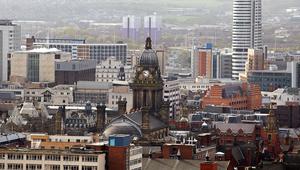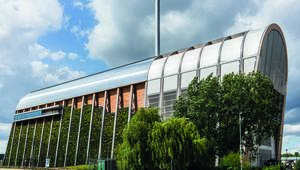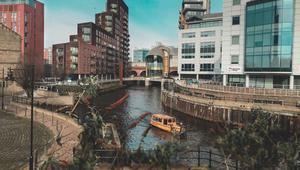This is the first Annual Report of the Leeds Climate Commission which was formally launched on 7th September 2017. The Commission has been operating throughout 2017 and this Report summarises its main activities and achievements and provides links to more detailed information on the Commission website.
Background & Purpose
Leeds has taken the pioneering step to establish the Leeds Climate Commission, to help Leeds to make a positive choice on issues relating to energy, carbon, weather and climate. It brings together key organisations and actors from across the city and from the public, private and third sectors. The Leeds Climate Commission is chaired by the University of Leeds (Leeds City Council is the vice-chair) who have also secured funding towards the initial secretariat costs.
Informed by the work of the UK Committee on Climate Change, the Leeds Climate Commission seeks to be an independent voice in the city, providing authoritative advice on steps towards a low carbon, climate resilient future so as to inform policies and shape the actions of local stakeholders and decision makers. It will monitor progress towards meeting the city’s carbon reduction targets and recommend actions to keep the city on track and advise on the assessment of the climate-related risks and adaptation opportunities in the city and on progress towards climate resilience.
The purpose of the Leeds Climate Commission is to:-
• Promote leadership in the city on climate change, encouraging stakeholders to take effective action now, while maintaining a long term perspective;
• Provide authoritative independent advice on the most effective steps required to meet the city’s carbon reduction target so as to inform policies and actions of local stakeholders and decision makers. Initially it will focus on the top 10-15 carbon reduction activities and top 10-15 carbon emitters;
• Monitor progress towards meeting the city’s carbon targets and recommend actions to keep on track;
• Advise on the assessment of the climate-related risks and adaptation opportunities in the city and on progress towards climate resilience;
• Bring together major organisations and key groups in Leeds to collaborate on projects that result in measurable contributions towards meeting the city’s climate reduction target and also to deliver enhanced climate resilience, particularly in the area of flood risk;
• Promote best practice in public engagement on climate change and its impacts in order to support robust decision-making;
• Act as a forum where organisations can exchange ideas, research findings, information and best practice on carbon reduction and climate resilience.
The Leeds Climate Commission’s Implementation Plan provides an ongoing update on progress with these areas of activity which are summarised in monthly bulletins and newsletters.
Leeds Climate Commission structure
A Strategy group comprising a Chair (initially from the University of Leeds), Vice-Chair (from Leeds City Council) and representatives from key organisations or sectors, including at least one person from each Working Group. The Strategy group will meet 4 times per year:
• To oversee the programme of deliverables;
• To take an overview of initiatives, projects and activities to ensure co-ordination, reduce duplication and foster synergy between projects;
• To act as a problem-solving forum;
• To agree, communicate and publish advice on meeting carbon reduction targets;
• To agree, communicate and publish advice on risk / opportunity assessment of climate change (from year 2).
At least 3 Working Groups meeting frequently enough to be able to report to the quarterly meetings of the Strategy Group. The Working Groups are:-
• Low Carbon Working Group: Information gathering by monitoring the performance of actual and proposed projects in the city, capturing carbon reduction data in an agreed format and preparing reports. Project portfolio delivery, funding and finance by taking a city-wide view of the carbon reduction and resilience projects and how they could be financed, including securing funding for the work of the Commission;
• Climate Resilience Working Group: Reviewing the range of climate adaptation initiatives in the city;
• Engagement & Communication Working Group: Facilitating the provision of authoritative and influential city wide communication material on climate change in the city.
Energy & Carbon Plan
One of the most important activities of the Commission has been to update the 2012 mini-Stern report on to cost-effective carbon reduction measures. Analysis by the University of Leeds has shown that by 2030 Leeds can save over £277 million annually or £348 a year for everyone in the city if it exploited all of the profitable measures for energy efficiency and low carbon development. This would also create 4,200 extra years of employment whilst also cutting carbon emissions for 22.7% on top of what is happening anyway. Leeds Climate Commission will help to ensure these opportunities become a reality by carrying out further detailed analysis of the measures needed to fill the gap between the impact of national schemes and local carbon reduction targets and to understand the scale of new investments by local partners in all sectors required to meet these targets.
The study assessed the total energy bills of the UK’s 50 biggest cities, which currently amount to over £35 billion a year, or an average of £1,500 per person. It found that simple, profitable improvements to heating, lighting, insulation, appliances and vehicles would reap extraordinary results. The manufacturing, installation and maintenance involved in implementing such improvements would create the equivalent of 90,000 new person-years of employment in 50 cities, whilst carbon emissions from these cities would be cut by almost a quarter more than currently expected. The up-front cost of the changes would total less than 1% of GDP annually for the next 10 years. Measures such as more efficient lighting in homes or cooling in retail buildings would cover their costs in approximately a year and generate profits thereafter.
The Best Energy Data Infrastructure for a City In the UK
All low carbon energy projects depend on getting up to date accurate data to provide the evidence base for new initiatives. Leeds Climate Commission member ODI Leeds is partnering with the SmartKlub network to create a centralised, city level data infrastructure, making open sources of energy data easily accessible.
The Top Energy Consumers In The City
The Commission has completed a research project identifying the largest energy consuming organisations in Leeds and will be using this evidence to inform a proactive programme of engagement with these organisations, many of whom are already represented on the Commission.
Success Stories
There is an incredible range of innovative action taking place across sectors in Leeds: The Commission’s website shares a selection of success stories from Climate Commission businesses and organisations to inspire and inform including:-
• Renewable energy projects by Yorkshire Water
• Low carbon new build and changing travel behaviour by CITU
• Leeds City Council’s flood alleviation scheme
• Building performance research by Leeds Beckett University
• Putting sustainability into practice in the NHS
• Energy efficiency at the University of Leeds
• Energy from Waste at Veolia’s Recycling & Energy Recovery Facility and the link to the plans for District Heating in Leeds
• Saving paper, saving trees and saving water at Walker Morris
• Large scale domestic energy efficiency programmes co-ordinated by West Yorkshire Combined Authority
• Low carbon consultancy advice from Arup
• The Leeds CityGate H21 Hydrogen feasibility study by Northern Gas Networks
• Low carbon and low emission vehicles by Leeds City Council
We would love to celebrate more success stories, including from individuals - please contact us and tell us what you are doing to reduce emissions and improve resilience to climate change and we will build on the library of success stories.
Events & Engagement
The Leeds Climate Commission aims to encourage active participation across the city in climate action and opportunities. The Leeds Climate Forum is one of the ways in which Leeds Climate Commission will bring people and organisations together to shape Leeds’ transition to a low carbon, climate resilient city. The forum will take place twice a year, in Spring and Autumn and we hope that it will attract a broad mix of people from the public, private and third sector as well as interested members of the public.
You can see the results of the first Climate Forum which took place on 10 October 2017 and was an open consultation on the Commission's report, 'A Low Carbon Strategy for Leeds' (see Our Energy and Carbon Plan).
Commission Chair, Professor Andy Gouldson, presented the strategy, outlining a range of cost effective options. Forum attendees were asked to feed back on three key issues:
• What can be done to close the gap between the emission reductions that the city is currently on track to achieve and what it must achieve to meet its targets;
• What are the most significant actions the city should take to ensure that it reaches its targets;
• What are the practical challenges of achieving these actions and how can they be overcome.
Leeds Climate Commission hosted a Climathon over two days on 26 and 27 October. Climathon is a 24-hour global climate change hackathon, co-ordinated by Climate-KIC. Students, starts ups, entrepreneurs, big thinkers, technical experts and developers get together for the marathon international challenge, which is now in its third year. Last year, 59 cities took part; this year 104 cities from 70 countries signed up. This was the second year that Leeds has participated in Climathon. The city itself sets the challenge; last year our focus was on energy efficiency and models for financing it in an age of austerity; this year, Leeds City Council set the challenge around the pressing issue of air pollution, specifically ‘How can Leeds pioneer clean air solutions to tackle air pollution and become a Clean Air/Low Emission City that improves Leeds for residents, business and visitors?’
Leeds Climate Commission was represented at the COP23 UN Climate Change talks in Bonn. Prof. Andy Gouldson and Andrew Sudmant spoke at an event at the UK Pavilion on the topic of ‘Empowering cities in the transition to a low carbon economy’ and were joined by Lord Deben (Chair of the UK Committee on Climate Change), Adrian Gault (interim Chief Executive of the UK Committee on Climate Change) and Nick Godfrey (Director of the Coalition for Urban Transitions). The event was encouraging and generated significant interest in the Leeds Climate Commission’s work thus far and going forward.
Future work
During 2018 the Leeds Climate Commission which will include further analysis to identify the most cost and carbon effective measures which will be needed to meet Leeds carbon targets for 2030 and 2050. The Leeds Climate Commission will also be able to evaluate other ways of reducing local carbon emissions such as through addressing food waste. The Commission’s work on Climate Resilience will be developed, again examining the most cost effective measures for the city. The Commission will also be engaging with the investment community to develop an approach to securing funding for future city wide projects, and will follow up engagement with the national Committee on Climate Change following Lord Deben’s attendance at the Leeds launch event. Updates on all of these activities will be published on the Commission website https://leedsclimate.org.uk






